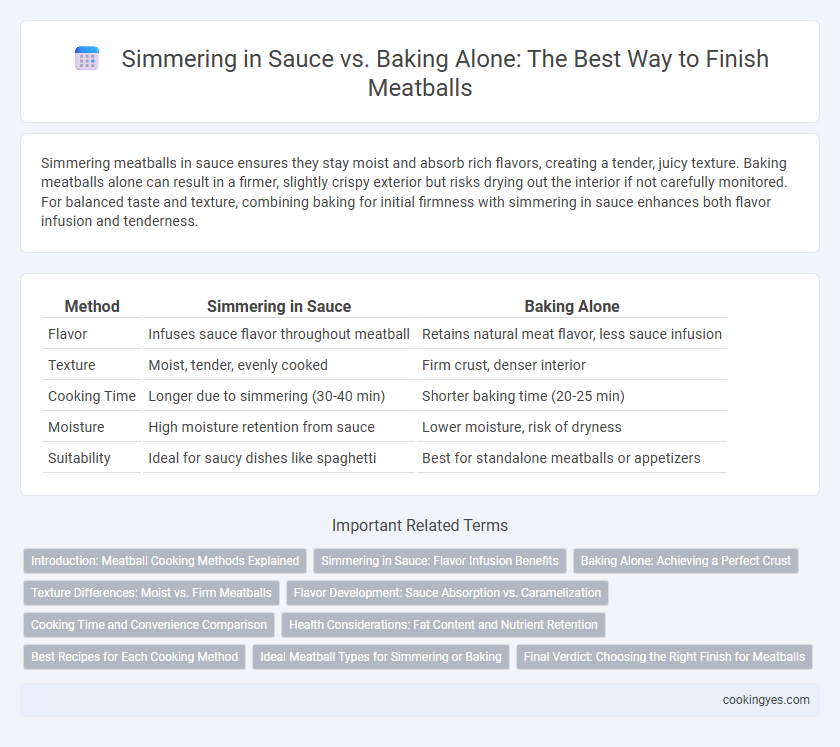Simmering meatballs in sauce ensures they stay moist and absorb rich flavors, creating a tender, juicy texture. Baking meatballs alone can result in a firmer, slightly crispy exterior but risks drying out the interior if not carefully monitored. For balanced taste and texture, combining baking for initial firmness with simmering in sauce enhances both flavor infusion and tenderness.
Table of Comparison
| Method | Simmering in Sauce | Baking Alone |
|---|---|---|
| Flavor | Infuses sauce flavor throughout meatball | Retains natural meat flavor, less sauce infusion |
| Texture | Moist, tender, evenly cooked | Firm crust, denser interior |
| Cooking Time | Longer due to simmering (30-40 min) | Shorter baking time (20-25 min) |
| Moisture | High moisture retention from sauce | Lower moisture, risk of dryness |
| Suitability | Ideal for saucy dishes like spaghetti | Best for standalone meatballs or appetizers |
Introduction: Meatball Cooking Methods Explained
Simmering meatballs in sauce enhances flavor absorption and keeps them moist through gentle, even heat transfer. Baking alone results in a firmer texture with a caramelized exterior but risks drying out the interior. Choosing between simmering and baking depends on desired taste intensity and texture preferences in meatball preparation.
Simmering in Sauce: Flavor Infusion Benefits
Simmering meatballs in sauce allows for deep flavor infusion as the meatballs absorb the herbs, spices, and acidity from the sauce, creating a cohesive and rich taste profile. This slow cooking method ensures moist, tender meatballs while blending the sauce and meat into a harmonious dish. Unlike baking alone, simmering prevents drying out and enhances the overall savory complexity of classic Italian or Swedish meatball recipes.
Baking Alone: Achieving a Perfect Crust
Baking meatballs alone results in a crispy, golden crust that enhances texture and flavor through caramelization. This dry heat method seals in juices, preventing moisture loss and preserving tenderness inside. Achieving a perfect crust requires evenly sized meatballs and consistent oven temperature, typically around 375degF (190degC) for 20-25 minutes.
Texture Differences: Moist vs. Firm Meatballs
Simmering meatballs in sauce results in a moist, tender texture as the meat absorbs moisture and flavors from the sauce throughout cooking. Baking meatballs alone produces a firmer, denser texture with a slightly crisp exterior due to direct dry heat exposure. The choice between simmering and baking affects juiciness and mouthfeel, with simmered meatballs offering softness and baked meatballs providing a substantial bite.
Flavor Development: Sauce Absorption vs. Caramelization
Simmering meatballs in sauce allows them to absorb rich flavors, resulting in a tender texture infused with the savory, aromatic qualities of the sauce. Baking meatballs alone promotes caramelization, creating a crispy outer crust with intensified Maillard reaction flavors that enhance depth and complexity. Combining both methods maximizes flavor development by balancing sauce absorption and caramelized crust formation.
Cooking Time and Convenience Comparison
Simmering meatballs in sauce typically requires 25 to 30 minutes, allowing flavors to meld and keeping the meat moist, while baking alone takes about 20 to 25 minutes with a risk of drying out if not carefully monitored. Simmering offers convenience by combining cooking and saucing in one step, reducing cleanup and ensuring consistent moisture. Baking provides faster cooking but demands attention to avoid overcooking and often necessitates a separate sauce preparation.
Health Considerations: Fat Content and Nutrient Retention
Simmering meatballs in sauce helps retain moisture and nutrients while allowing fat to blend into the sauce, reducing the overall fat content per serving. Baking meatballs alone results in some fat being rendered out, which can lower fat content but may cause nutrient loss through drying. Choosing simmering preserves more vitamins and minerals, supporting a healthier, flavorful dish with balanced fat absorption.
Best Recipes for Each Cooking Method
Simmering meatballs in sauce enhances moisture retention and infuses rich flavors, making it ideal for recipes like classic Italian marinara meatballs or Swedish meatballs in creamy gravy. Baking meatballs alone develops a firmer texture and caramelized exterior, perfect for crispy meatballs like baked mozzarella-stuffed meatballs or spicy baked turkey meatballs. Choosing between simmering or baking depends on desired texture and sauce integration, with each method offering distinct culinary advantages for meatball recipes.
Ideal Meatball Types for Simmering or Baking
Simmering in sauce is ideal for tender, moist meatballs made from a mix of ground beef, pork, or veal combined with breadcrumbs and eggs, as the gentle cooking method infuses flavor while preserving softness. Baking alone suits denser meatballs, such as those made from lean ground turkey or chicken, providing a firmer texture and a crisp exterior without added moisture. Choosing the cooking method based on meatball composition enhances taste and texture, with simmering best for moist blends and baking optimal for lean, compact mixtures.
Final Verdict: Choosing the Right Finish for Meatballs
Simmering meatballs in sauce ensures they absorb rich flavors and stay moist, resulting in a tender texture ideal for dishes like spaghetti. Baking meatballs alone creates a firmer, caramelized exterior that holds shape well and suits appetizers or sandwiches. The choice depends on desired texture and flavor infusion, with simmering favored for softness and integrated taste, while baking offers a crisp finish.
Simmering in Sauce vs Baking Alone for Meatball Finish Infographic

 cookingyes.com
cookingyes.com